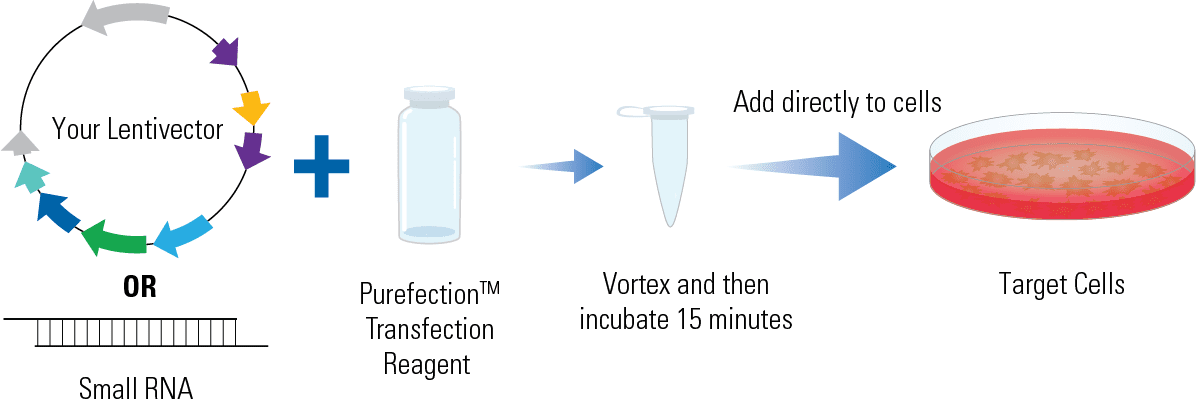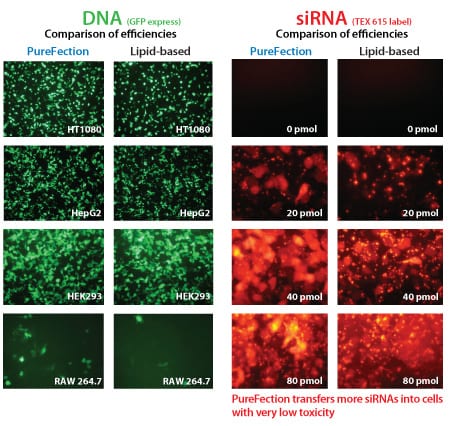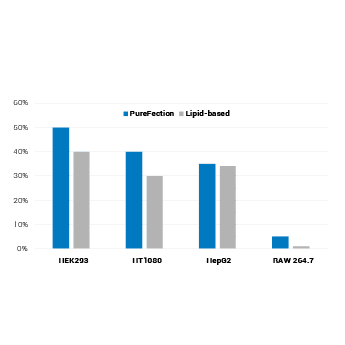PureFection™ Transfection Reagent
- Highly effective transfection technology—works with most cell types
- Cost-effective alternative to lipid-based products
- Nanoparticle-based gene delivery with low toxicity
- Rapid 15-minute protocol makes PureFection ideal for high-throughput transfections
- Works with both Plasmid DNA and siRNAs
Products
| Catalog Number | Description | Size | Price | Quantity | Add to Cart | |||
|---|---|---|---|---|---|---|---|---|
| LV750A-1 | PureFection Transfection Reagent | 1 mL | $454 |
|
||||
| LV750A-5 | PureFection Transfection Reagent | 5 mL | $1834 |
|
||||
Overview
Overview
Increase your transfection efficiencies
With SBI’s PureFection™ Transfection Reagent, you can deliver more nucleic acid—plasmids, siRNAs, etc.—than the leading lipid-based transfection reagent for effective, efficient, and reproducible transfections.
The easy-to-use protocol consists of a rapid, one-step, 15-minute incubation with the plasmid, small RNA, or other nucleic acid you’d like to transfect. Once the incubation is done, simply add directly to target cells—no media changes are required as PureFection works in the presence of antibiotics and serum.
The fast PureFection protocol makes it well-suited for high-throughput transfection projects.
- Highly effective transfection technology—works with most cell types
- Cost-effective alternative to lipid-based products
- Nanoparticle-based gene delivery with low toxicity
- Rapid 15-minute protocol makes PureFection ideal for high-throughput transfections
- Works with both Plasmid DNA and siRNAs
References
How It Works
Supporting Data
FAQs
Documentation
Citations
Related Products
Products
| Catalog Number | Description | Size | Price | Quantity | Add to Cart | |||
|---|---|---|---|---|---|---|---|---|
| LV750A-1 | PureFection Transfection Reagent | 1 mL | $454 |
|
||||
| LV750A-5 | PureFection Transfection Reagent | 5 mL | $1834 |
|
||||
Overview
Overview
Increase your transfection efficiencies
With SBI’s PureFection™ Transfection Reagent, you can deliver more nucleic acid—plasmids, siRNAs, etc.—than the leading lipid-based transfection reagent for effective, efficient, and reproducible transfections.
The easy-to-use protocol consists of a rapid, one-step, 15-minute incubation with the plasmid, small RNA, or other nucleic acid you’d like to transfect. Once the incubation is done, simply add directly to target cells—no media changes are required as PureFection works in the presence of antibiotics and serum.
The fast PureFection protocol makes it well-suited for high-throughput transfection projects.
- Highly effective transfection technology—works with most cell types
- Cost-effective alternative to lipid-based products
- Nanoparticle-based gene delivery with low toxicity
- Rapid 15-minute protocol makes PureFection ideal for high-throughput transfections
- Works with both Plasmid DNA and siRNAs




